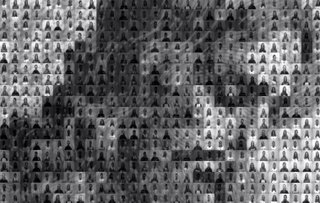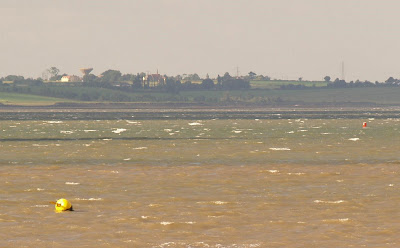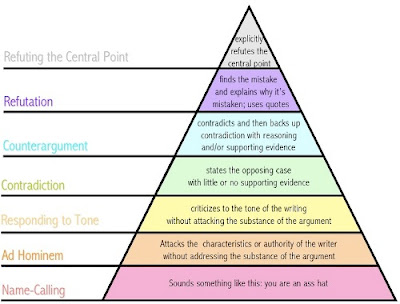An old post which I’m bringing up front in response to the request from James, and NMMNG’s comment about cheap shots. Consider this a more expensive shot! Originally posted 22nd December 2005.
Some thoughts about intelligent design and evolution
Intelligent design has been in the news again – a sensible judge has ruled that it is not a scientific theory, and therefore it would be unconstitutional for it to be taught in public schools in the US. So far, so straightforward. What I am going to argue here is that ID is actually a mistake on theological grounds, and rests upon both a mistaken understanding of the worth of science, and, indeed, a mistaken understanding of the nature of God.
The argument between ID advocates and the establishment evolutionary theorists seems frequently to centre on ‘what cannot be explained’. For example Michael Behe argues that some systems are ‘irreducibly complex’ – in other words, they depend upon the prior existence of other complex elements before they become evolutionarily useful. In order to have element A which is a benefit, you also need elements B and C – but you can’t have B without A and C, and you can’t have C without A and B. Behe uses the example of a mousetrap – you need five parts to the mousetrap (base, spring, etc) for it to be a mousetrap at all. If any of the elements are missing, then there is no mousetrap, there is no evolutionary advantage – therefore there must be some conscious design which brings the different elements together.
Now Behe’s specific criticisms seem fairly weak (although the conceptual point is interesting) but his is just one example of various criticisms that can be made of established evolutionary theory. I have much sympathy with the general point that there are big holes in it – that, in the words of one review I read, ‘the big scientific story of the 21st century will be the overthrow of Darwinian evolution’ – and the grounds for that are, in essence, that the neo-Darwinian synthesis is built on Newtonian physics, and just as Newtonian physics has been put in its place, so too will the neo-Darwinian synthesis – but this overthrow will be accomplished by a genius biologist, working within established scientific arenas, not by a theologian. (Might be a MoQ inspired scientist though…)
For the issue of explanatory gaps and problems within evolutionary theory is a question of science – as the good judge has determined. It has absolutely nothing to say of theological interest. Worse, those who try to use these (wholly to be expected and normal) ‘gaps’ in the theory are actually engaged in very bad Christian thinking. For what we have is a form of ‘God of the gaps’ argument. Hey! Here is something that science can’t explain! Well THAT must be where God is! Phew! Thought we’d lost Him just then…
The ID advocates have already conceded far too much to science. They are arguing that because there are specific details which science cannot account for (eg evolution of the eye – tho’ they should read Dawkins on that one) therefore ‘God’ must be the explanation, and therefore this is a good argument for the existence of God. But the God that they are arguing for is a scientific artefact – an object – an idol. In the terms of the debate they have implicitly accepted that scientific standards of evaluation and judgement are the appropriate standards by which to judge the question of God’s existence – and this is idolatry. Those who argue that Intelligent Design is Christian do not know what they are talking about. Intelligent Design is a heresy, a blasphemy, a denial of the living God.
The issue at stake between the Christian and the atheist forms of evolutionary theory (eg Dawkins – not all those who work in the field of evolutionary theory are atheist) does not rest upon one particular instance or other. God cannot be ‘proven’ by the presence of a problem which science cannot give a full account of. On the contrary, the issue is one of how to interpret the whole. God is either fully present as Creator throughout all of the creation; or there is no God. To say that at the point where the scientific explanation comes up short – there is God – this is an abandonment of the faith, this is the Vichy regime of theologies.
The Christian insistence upon a creator is not the assertion of a scientifically established ‘fact’ – it is the assertion of the correct way to interpret all facts. It is about an attitude and orientation towards life – to receive all of life as a gift, and therefore to live in thanksgiving (eucharist) for that gift – and is therefore primarily about asserting that this world is a meaningful world. It is not the assertion of a fact ‘within the world’ – it is an assertion about the world as a whole.
So let me finish with an analogy, which may make my point clear. Consider a television screen (or a computer monitor). Go right up close, and all you can see are individual dots, picture elements, what we now call pixels. They are of myriad different colours; they change periodically. Science is about establishing the nature of the pixels – is this pixel green? Is this pixel blue? Intelligent Design is saying ‘No, this pixel isn’t blue, this pixel is God!’
God is not a pixel.
We step back from the screen – we put scientific endeavour into its proper context – and we see that there is the image of a man on the screen. It is an interpretation of the whole, it is not a question of detail.
Someone profoundly trained in science may still not be able to see the image. It is a Rorschach test, and this is the fundamental divide – is this pattern of dots meaningful or not? If it is – there is God. This is not a scientific question. This is not a question of intelligent design. This is a question of the language you use to describe the presence of meaning in the world.
‘I should like to say that … the words you utter or what you think as you utter them are not what matters, so much as the difference they make at various points in your life. How do I know that two people mean the same when each says he believes in God? And just the same goes for belief in the Trinity. A theology which insists on the use of certain particular words and phrases, and outlaws others, does not make anything clearer… It gesticulates with words, as one might say, because it wants to say something and does not know how to say it. practice gives the words their sense’. (Wittgenstein)
And









